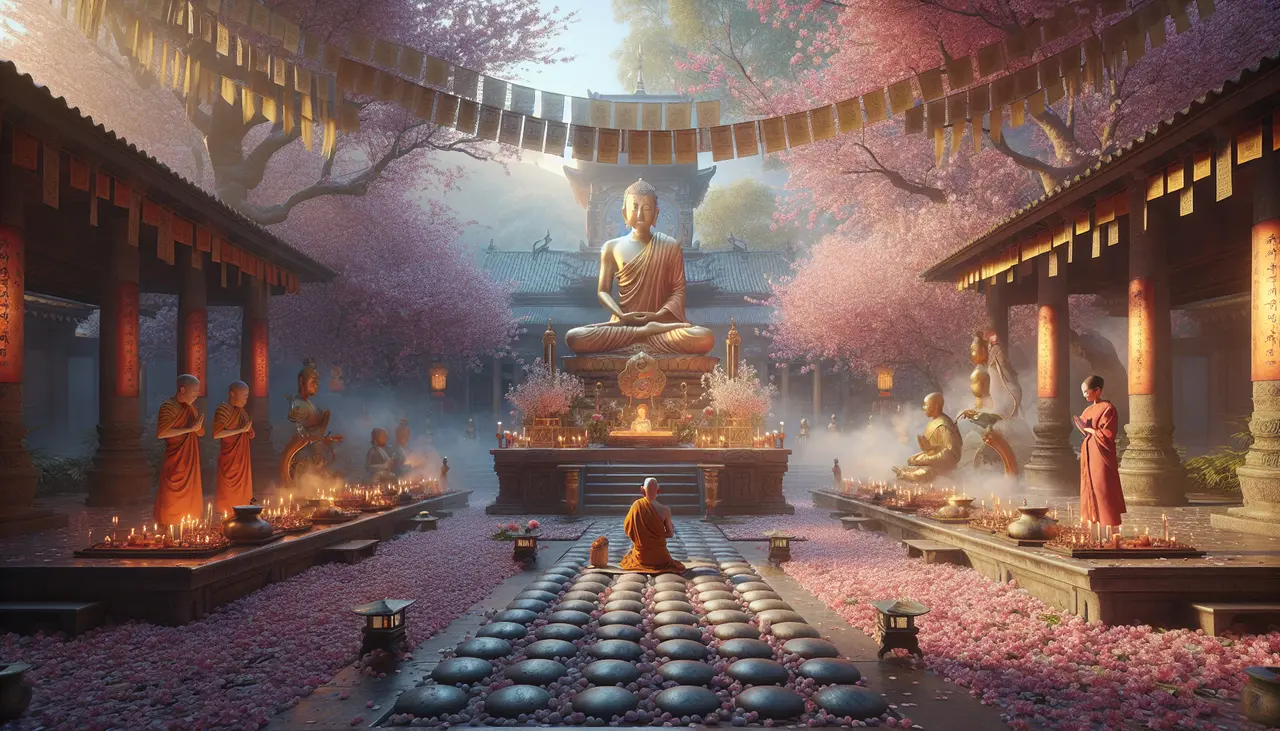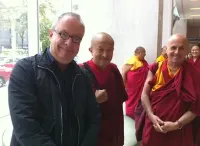Help Crestone Films bring
the wisdom traditions to global audiences.


Blog
Reviews

Capturing the Essence of Buddhist Teachings in Documentaries
Buddhist teachings have long served as a profound source of wisdom and inspiration, offering valuable insights into the nature of existence and the path to inner peace. Documentaries that capture these teachings offer viewers a unique opportunity to delve deeply into these ancient philosophies, presenting them in a modern context. In this blog, we explore how filmmakers distill the essence of Buddhist teachings, creating compelling visual narratives that resonate with audiences worldwide.

Exploring the Foundations of Buddhist Perspectives
Documentary filmmakers often begin by exploring the foundational concepts of Buddhism, such as the Four Noble Truths and the Eightfold Path. These documentaries illuminate how these core principles guide the daily lives of practitioners and influence their outlook on life. For instance, films like BUDDHA'S LOST CHILDREN delve into the experiences of individuals who find solace and direction through the steadfast application of these teachings. The narratives often showcase how Buddhist principles assist individuals in navigating personal and societal challenges. Viewers are encouraged to consider their place in the world, reflecting on how ancient wisdom might offer solace and guidance in complex modern times.
The richness of Buddhist traditions is further highlighted through interviews with practitioners and scholars who offer firsthand insights into the enduring relevance of these teachings. They discuss the continuous practice of mindfulness and compassion, which are cornerstone themes of Buddhism that help cultivate personal growth and community well-being. As filmmakers weave these interviews with meditative imagery, they invite viewers into a reflective space where the past and present coalesce, offering a holistic exploration of Buddhist philosophy. This approach not only informs but also inspires audiences by highlighting the attainable virtues within Buddhism that promote personal and societal flourishing.
Incorporating Visual Storytelling Techniques
To effectively communicate Buddhist teachings, filmmakers employ a variety of visual storytelling techniques that capture the subtle yet profound nature of the philosophy. The use of serene imagery, such as that involving peaceful meditation practices against the backdrop of nature, evokes a sense of tranquility that mirrors the internal peace sought by practitioners. Films like YANGSI vividly portray these meditative practices, offering audiences a visual representation of the path to enlightenment. By accompanying such imagery with narratives of personal spiritual journeys, filmmakers connect the philosophy to real-life experiences, thereby making the teachings accessible and relatable.
Soundscapes also play a crucial role in these documentaries, as the careful incorporation of traditional chants and ambient sounds of sacred places deeply enriches the sensory experience. They guide viewers through a tapestry of auditory landscapes that complement the visual feast, aiding in crafting a holistic representation of Buddhist life. This is evident in works like NURTURING COMPASSION, where the soundtracks underscore the narrative, emphasizing the thematic journey towards compassion and understanding.
Showcasing Diverse Cultural Interpretations
Buddhism manifests in various forms across different cultures, each adding its own unique interpretation to the teachings. Documentaries delve into these diverse perspectives, offering a rich tapestry of practices and beliefs that highlight the adaptability and universal appeal of Buddhism. Through films like AWAKE: THE LIFE OF YOGANANDA, viewers are introduced to how Buddhist philosophies intertwine with other spiritual paths, revealing the harmonious coexistence of diverse spiritual practices.
In particular, documentaries exploring the intersection of Buddhism and modern cultures provide a compelling narrative on how Buddhist teachings are adapted and practiced in contemporary settings. For example, the film DALAI LAMA RENAISSANCE not only highlights the global impact of Buddhist teachings but also showcases their relevance in today's world, where compassion and mindfulness are increasingly recognized for their potential to bring about meaningful societal change.
Addressing Modern Challenges Through Buddhist Philosophy

Many documentaries address how Buddhist teachings can provide answers to contemporary issues such as mental health, environmental concerns, and social justice. By linking ancient wisdom to modern challenges, these films present Buddhism as a relevant and valuable guiding force in today's fast-paced world. For instance, the issues of mental wellness are sensitively handled in numerous Buddhist documentaries, highlighting practices like mindfulness and meditation as effective tools for managing stress and fostering emotional well-being. These practices are increasingly resonated with modern audiences due to their efficacy and simplicity.
Moreover, environmental themes in these documentaries emphasize Buddhism's holistic view of the world, encouraging practices that promote sustainability and respect for all forms of life. These narratives often align with global movements towards eco-conscious living, further cementing Buddhism's role as a philosophical bedrock capable of addressing environmental challenges in the 21st century.
Profiles of Influential Buddhist Figures
Some documentaries focus on influential Buddhist figures who have played significant roles in spreading the teachings globally. Through interviews and personal stories, these films offer insight into the life and impact of these spiritual leaders, illustrating the personal journey of growth and enlightenment. Films such as BODHISATTVA provide unprecedented access to the 17th Gyalwang Karmapa, exploring his influence in the Western world and how his teachings bridge cultural divides.
These profiles are not just historical accounts; they are living narratives that demonstrate the timeless applicability of Buddhist teachings. The struggles and triumphs of these figures often mirror the challenges faced by individuals today, providing tangible examples of how the pursuit of enlightenment and compassion can lead to profound personal and societal transformations.
Reflecting on the Transformative Power of Buddhist Documentaries
The art of creating documentaries that encapsulate Buddhist teachings is a delicate balance of authenticity, creativity, and sensitivity. By portraying the philosophy's core tenets and celebrating diverse perspectives within Buddhism, these films encourage deeper reflection and understanding. Through these compelling visual stories, audiences are invited to connect with the tranquil and transformative potential of Buddhist wisdom, inspiring them to seek their own path to enlightenment. We encourage you to explore the transformative work being done by Crestone Films and consider how these visual stories can act as a guide on your own spiritual journey.
“Physically and psychically transformative.”
YOGA JOURNAL
“[THE LION'S ROAR] speaks with uncommon clarity on the nature
of Buddhist life and thought… An important, lasting monument.”
“[YANGSI] unfolds in a cinema verité style that
offers an absorbing, intimate glimpse into a
religious tradition, a culture and a remarkable life. ”
“Beautifully done, [BODHISATTVA]
is a charming, educational, uplifting treasure.”
LIGHT OF CONSCIOUSNESS MAGAZINE
“Astonishing.”
SPIRITUALITY AND PRACTICE
ONLINE MEDIA

© 2024 by Crestone Films
